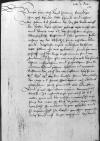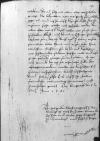Wir habenn Euer Lieb ⌊⌋, / des datum helt ⌊Braunspergk⌋ den dritten dieses monats gestrigs tages ennpfangen / unnd daraus wes Euer Lieb des ernvhestenn unsers obermarschalchs, raths unnd lieben getreuenn ⌊Friderichenn von der Olschnitz⌋ etc. seinen mhulbaw belangende, / desgleichen unsers underthans ⌊Bartholmes Vogts⌋ halbenn ahn uns geschriebenn, / sampt fernernn inhalth nach der lenge eingenommen unnd verstandenn. / Nhun thun wir uns ihns erste des freuntlichenn nachbarlichenn unnd guthwilligenn ihnn berurtenn bedenn sachenn, / beschehenen Euer Lieb erpietens. /
Nichtsminder auch des uberschigktenn ⌊⌋ von ⌊Romischer kayserlicher maiestet⌋ oberstem cantzler hernn ⌊Granvella⌋, / den wir Euer Lieb hiemit ihrem begernn nach widerumb ubersendenn, / gantz freuntlichs vleis bedanckenn. / Unnd so viel obgemeltenn unsernn ⌊obermarschalch⌋ betrifft, / ist nachmals unser freuntliche bit, Euer Lieb wollen unns mit der entlichen antwort (ihn ansehung, das wir ihn kurtz denselben unseren obermarschalch ihn anderenn unseren geschefften unnd zu unserem zugk zur Littischen grenitzenn geprauchen muessenn) nicht lenger vertziehenn, / sondernn unns ires gemuts entliche meinung dissfhals eroffenenn. /
Dan so ihme von Euer Lieb unnd ihrem ⌊wirdigenn capittel⌋ diese gnad erzeigt, / werden moch..., das ehr den paw abzuprechenn nit gedrungenn, / geschehe unns / zu sonderm freuntlichem gefhallenn. Wo ehr aber ihe prechen solt und must, / welchs ehr doch ane seinen mergklichen schadenn unnd nachteil / nicht thun khan, / heet ehr sich auch darna[ch] zurichtenn / unnd könte als dan wissen waran[n] ehr where. /
Was aber unsernn underth[an] ⌊Bartholmes Vogten⌋ anruren thut. / Wissenn wir nicht, / wie ehr wol mit den parthen einn einigung treffenn mocht. / Es wher dan sach, das Euer Lieb underhendler dartzu verordnen thet. / W[ie] wir zubeschehen auch hiemit freuntlichen bittenn, / ... das Euer Lieb einen tag dartzu ansetzen unnd ernenne[n] wolthenn. / Welchs wir als dan unserm undert[han] sich darnach zuhalthenn, / auch konthen anzeigen unnd vormelden lassen. / Dan sonstenn unnd a[hne] underhendler werden sich die parthen schwerlich voreinigenn./
Das sich aber Euer Lieb freuntlichenn gegen uns erpiet... ob wir ahn ⌊Romischer kayserlicher maiestet⌋ ⌊gros cantzlern⌋ obgeme... durch Euer Lieb ihn unseren sachen etwas zuschreibenn b... wurdenn, / das Euer Lieb solchs mit allem vleis vortzustellen geneigt / des bedanckenn wir uns gantz freuntlichen gegen Euer Lieb unnd wissen auff dissmhal nichts, / das ihn unserenn sachen weither mocht geschrÿeben werden, / dan allein bitten wir Euer Lieb dieselb wollen, / woe sie ahn ihnen zuschreibenn bedacht, / auch dis mit anzuhengen freuntlichen ubeschwert sein etc. das ehr ⌊koniglicher maiestet zu Polan⌋ etc. unsers freuntlichen lieben oheims, / auch unsere sachen ihme treulichenn bevholenn sein lassen und dieselbigenn mit hochstem vleis furderen helffen wolle / unnd unser guther freundt alwegen sein unnd pleibenn. / So wir auch jemandt der orth fur unser person schicken oder abfertigenn werdenn, / wollen wir denselbigen Euer Lieb zuvornn anzusprechenn / bevelch aufferlegenn. /
Unnd habenn solchs Euer Lieb auff ihr schreibenn freuntlicher wolmeinung ihn antworth nicht zuvorhalthen gewust. /
Von Gots gnaden ⌊Albrecht marggraff zu ⌊Brandenburgk⌋, ihn ⌊Preussen⌋, zu ⌊Stetin⌋, ⌊Pomernn⌋, der ⌊Cassuben⌋ unnd ⌊Wenden⌋ herzog⌋, burggraff zu ⌊Nurmbergk⌋ unnd furst zu ⌊Rugen⌋ manu propria subscripsit



